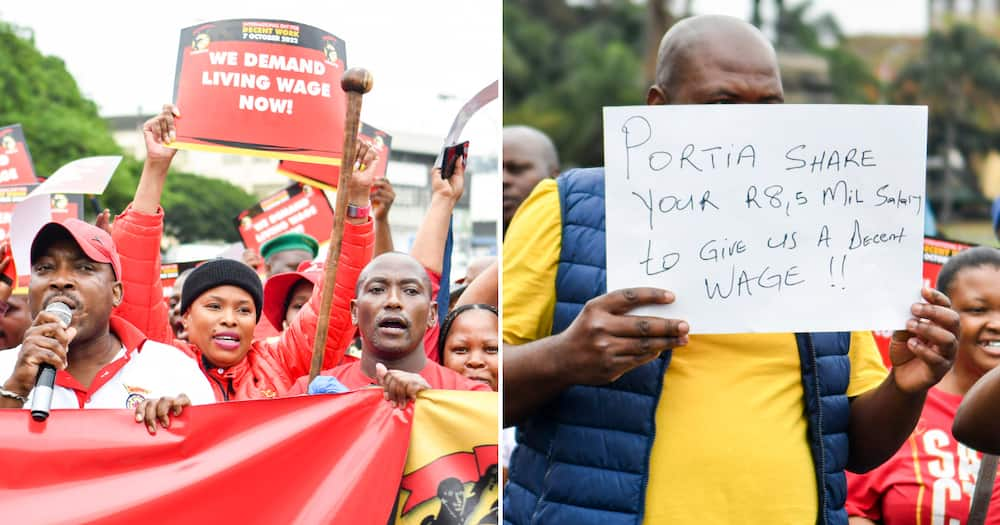How Will Transnet’s Wage Strike Impact South Africans? Consumer Goods Shortages and 3 Other Questions Answered
- It has been more than a week since Transnet workers embarked on a strike for better wages
- The industry-wide protest has impacted many businesses, the economy, workers in other industries and even consumers
- The strike will soon impact South African consumers because cargo goods are still stuck at the ports
PAY ATTENTION: Click “See First” under the “Following” tab to see Briefly News on your News Feed!

Source: Getty Images
How will the Transnet workers' protest over wages affect the country's economy, businesses, consumers and other sectors' workers?
How does the Transnet strike impact business?
Many cargo ships are currently stuck at the ports due to the strike, and the ports cannot operate fully.
Business Unity SA CEO Cas Coovadia explained in an interview on 702 that fruit cargo that was supposed to be exported is still stuck at the ports and runs the risk of decay, which means a loss of money.
PAY ATTENTION: Follow us on Instagram - get the most important news directly in your favourite app!
This loss will also impact the agriculture industry and force investors to go elsewhere.
Jaco Minnaar, president of Agri SA, explained that the Transnet strike would further affect the confidence in South Africa and Transnet, which is already rated the worst port terminal in the world by the World Bank.
Businesses are concerned that cargo ships might skip South African ports and remove the country from the schedule if the strike continues.
If these ships skip SA, it will increase the cost of airfreight or trucking goods to and from other African ports, which will add to South Africans' rising inflation.
Some businesses have offered to pay additional levies to help Transnet bridge the gap between their offer and what workers are demanding, reports BusinessLIVE.
However, BUSA says temporarily increasing levies would have unintended consequences in the future.
How are consumers affected by the Transnet strike?
The Transnet strike has a rippling effect on South African consumers. Soon enough, consumer goods will be stuck at the ports, thus leading to a shortage in stores or online.
CEO of the South African Association of Ship Operators and Agents, Peter Besnard, explained that the backlog at the ports means that some plants are running low on stock and will have to shut down temporarily, reports SowetanLIVE.
Besnard further explained that millions of rands worth of goods from China, Europe, South America, and the United States of America are waiting to be offloaded. He also warned that if the strike does not end, these goods might not reach shelves in time for the Christmas peak.
How does the Transnet strike affect other industries' workers?
According to Besnard, on Tuesday, 4 October, there were six container vessels, 18 bulk carriers, one multi-purpose vessel, three tankers and two carriers waiting to be offloaded.
IOL reports that since the ports closed, trucking companies have stopped operations. Their employees are not earning money because they have no goods to transport.
How much money is the South African economy losing to the Transnet strike?
South Africa's struggling economy is expected to take a huge hit as the strike continues.
Business Leadership South Africa (BLSA) CEO Busi Mavuso predicts the strike will cost South Africa's economy billions as imports and exports have been halted.
Mavuso describes the strike as an act of economic sabotage that will harm government revenue and deprive it of resources needed to alleviate poverty, reports Engineering News.
South African Association of Freight Forwarders (SAAFF) CEO Dr Juanita Maree stated that based on calculations made during the Covid-19 pandemic, logistics delays to the supply chain cost our economy between R100 million and R1 billion a day.
Mavuso explained that such a loss would mean the South African government would lose out on R27 billion in tax revenue, which could be used for social relief from distress.
However, the Durban Chamber of Commerce and Industry president Prasheen Maharaj estimates that the strike could cost the SA economy between R12 - R15 billion.
Why have Transnet workers gone on strike?
Wage negotiations have been at the heart of the Transnet strike, which started on 6 October.
Trade unions and Transnet management have been locked in wage negotiations for a while. The Commission for Conciliation, Mediation and Arbitration (CCMA) is mediating the negotiations.
Transnet initially offered workers a 3% salary increase which was rejected by workers who were adamant about only accepting an offer above the inflation rate or between 12 - 13%.
The United National Transport Union (UNTU), the South African Transport and Allied Workers Union (SATAWU) and Transnet returned to the negotiation table on Wednesday, 11 October. Transnet offered workers a 4.5% increase, including medical insurance, according to Aljareeza.
Transnet also offered to increase wages by 5.3% annually for the next two years. Both unions rejected this offer and vowed to continue their strike until Transnet met their demands.
UNTU general secretary Cobus van Vuuren told Reuters news agency that the strike action and picketing would only intensify in the coming days because Transnet was unreasonable.
Transnet former top execs Brian Molefe & Anoj Singh expected to appear in court on fraud & corruption charges
In other news, Briefly News reported that former Transnet bosses CEO Brian Molefe and CFO Anoj Singh were arrested on Monday, 29 August, for their involvement in a fraud and corruption case.
Members of the National Prosecuting Authority’s Investigating Directorate, and the Hawks swooped in on them.
ID Spokesperson Sindisiwe Seboka told TimesLIVE that the arrests were made through arrangements with legal representatives.
The case relates to a R93 million deal involving former Transnet CEO Siyabonga Gama, former acting CFO Garry Pita, former group treasurer Phetolo Ramosebudi, Regiments Capital shareholder Eric Wood and his employee Daniel Roy, and Kuben Moodley, owner of Albatime.
PAY ATTENTION: Сheck out news that is picked exactly for YOU ➡️ find the “Recommended for you” block on the home page and enjoy!
Source: Briefly News






